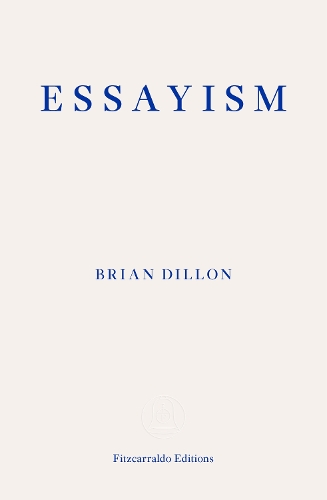
Essayism
(Paperback)
Publishing Details
Essayism
By (Author) Brian Dillon
Fitzcarraldo Editions
Fitzcarraldo Editions
7th July 2017
7th June 2017
United Kingdom
Classifications
General
Non Fiction
808.4
Physical Properties
Paperback
152
Width 125mm, Height 197mm
Description
The essay is a venerable form that may well be the genre of the future. It has its origins in a mode of self-examination and even self-obsession - 'it is many years now that I have had only myself as object of my thoughts', writes Montaignein his essay 'Of Practice' - but it is just as accurately defined by its vagrant and curious scope, its capacity to suborn any and every object to its elegant remit. It may not in fact be 'well made' at all, but a thing of fragments and unfinished apercus, or an omnium-gatherum like Robert Burton's capacious but recognizably essayistic Anatomy of Melancholy.
The essay may not even be written, but instead a photo essay, film essay, radio essay or some hybrid of these and the literary archetype. It may belong to a self-conscious genre and have been written by an essayist who self-declares as such; or it might be conjured from a milieu where the labels 'essay' and 'essayist' would make no sense at all. The essay, in short, isa varied and various artefact. Its occasion might be scholarly - there are academic essays, though they tend to be essays to the extent that they wish to stop being academic - or it may be journalistic, institutional or 'creative'. The essay can be tethered to a specific (perhaps polemical) context or written with an ambition to timeless or universal import. Whatever its motivation or avowed theme, the essay possesses a style and a voice. Generic, structural and contextual definitions will vary, but the essay is at least recognizable by its having a certain texture - the essay alters or interferes to some degree with the language of non-fiction.
Essayism is a personal, critical and polemical book about the genre, its history and its contemporary possibilities, itself an example of what it describes: an essay that is curious and digressive and at the same time held together by a personal voice and a polemical point.
'Dillon is a literary flaneur in the tradition of Baudelaire and Walter Benjamin - it is its own kind of self-made masterpiece.' - John Banville, Irish Times
Reviews
'A wonderful, subtle and deceptively fragmentary little book ... enjoyably roundabout and light-fingered ... To borrow from one of Barthes's titles, this is a lover's discourse, the love object being writing, not only in the essay but in all its forms. It is also a testament to the consolatory, even the healing, powers of art. And at the last, in its consciously diffident fashion - Dillon is a literary flaneur in the tradition of Baudelaire and Walter Benjamin - it is its own kind of self-made masterpiece.' - John Banville, Irish Times
'Brian Dillon could easily have written another book about the essay - its hallmarks, history, current role in literary turf wars, etc. What a relief, then, to find his Essayism navigating away, in its opening pages, from such a project, and turning instead toward this surprising, probing, edifying, itinerant, and eventually quite moving book, which serves as both an autobiographia literaria and a vital exemplar of how deeply literature and language can matter in a life.' - Maggie Nelson, author of The Argonauts
'It's short, digressive, teasing, dilettantish, circular, and it reads like some delicate, wandering combination of Roland Barthes's Camera Lucida and E. M. Cioran's longer aphorisms. As Dillon examines his examples of essayism, and steadily reveals more of himself, so his own work joins those cherished selections, enacting in sentence after fine sentence the theory it modestly abjured.' - James Wood, New Yorker
Author Bio
Brian Dillon was born in Dublin in 1969. His books include Suppose a Sentence, Essayism,The Great Explosion (shortlisted for the Ondaatje Prize), Objects in This Mirror: Essays, I Am Sitting in a Room, Sanctuary, Tormented Hope: Nine Hypochondriac Lives (shortlisted for the Wellcome Book Prize) and In the Dark Room, which won the Irish Book Award for non-fiction. His writing has appeared in the Guardian, New York Times, London Review of Books, Times Literary Supplement, Bookforum, frieze and Artforum. He is UK editor of Cabinet magazine, and teaches Creative Writing at Queen Mary, University of London.
